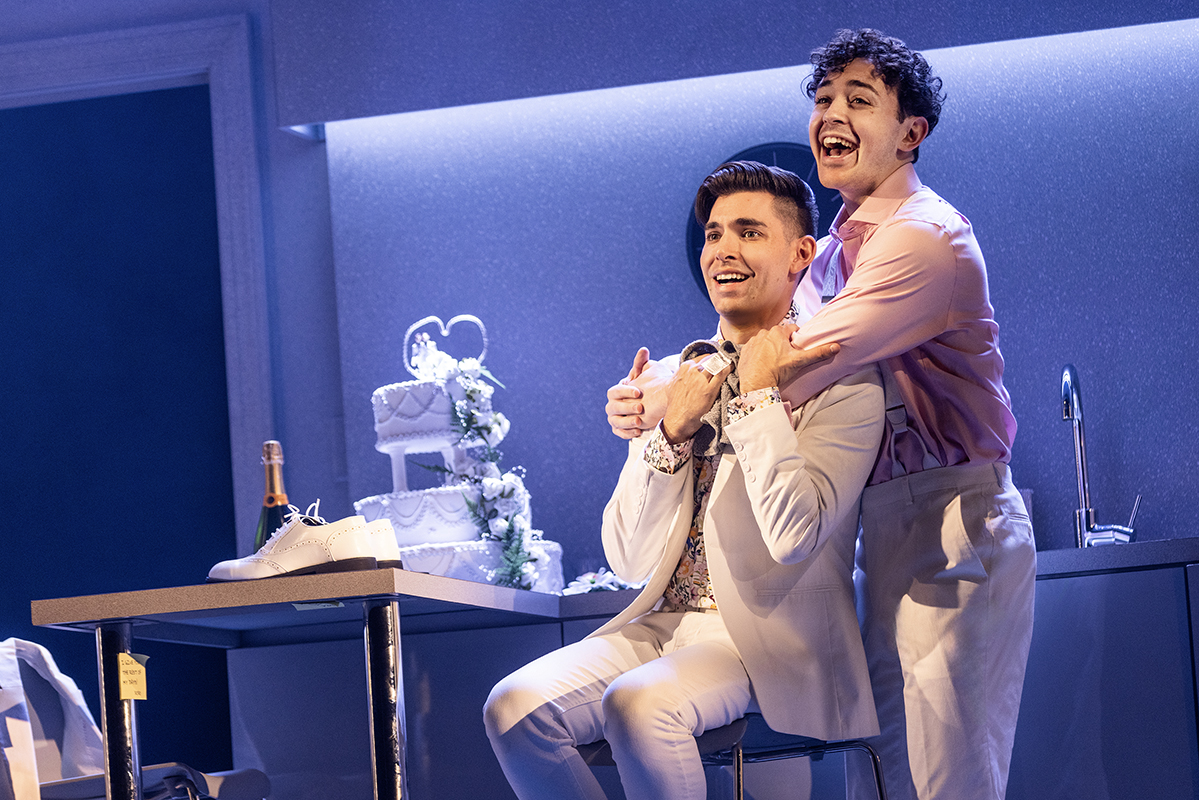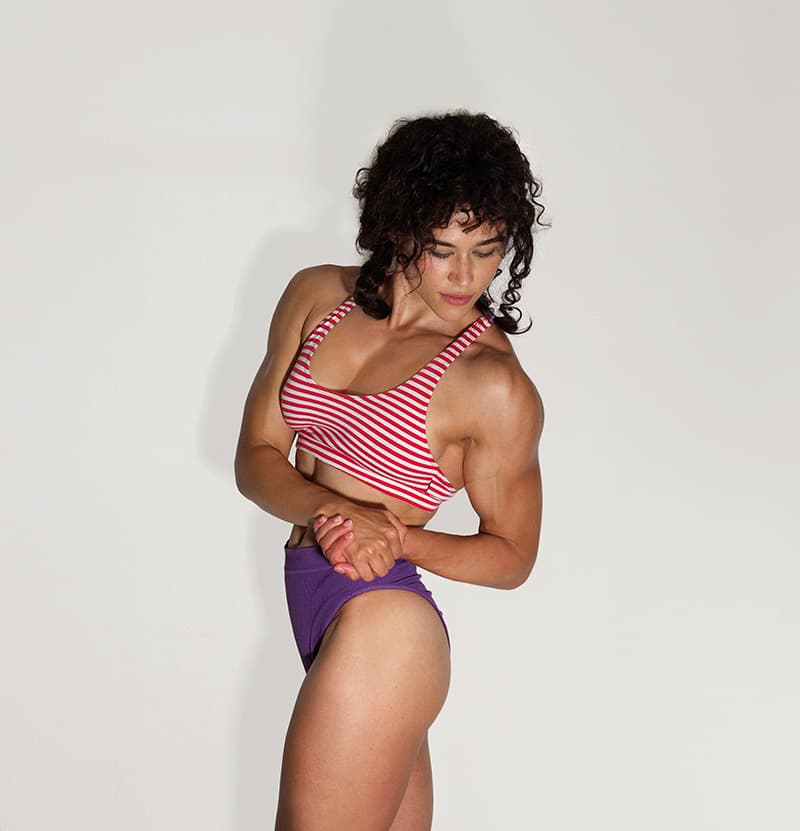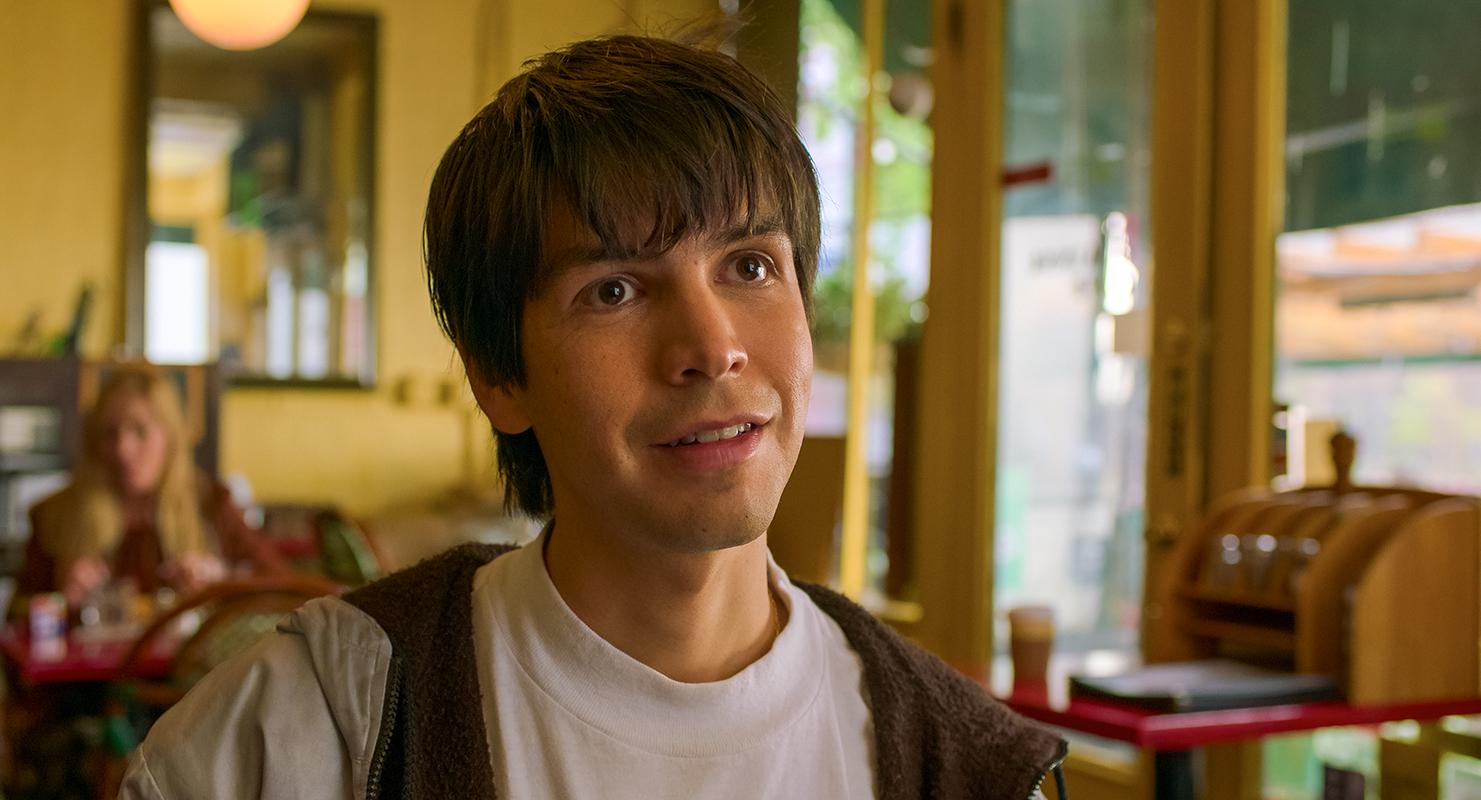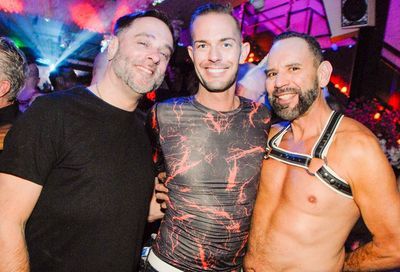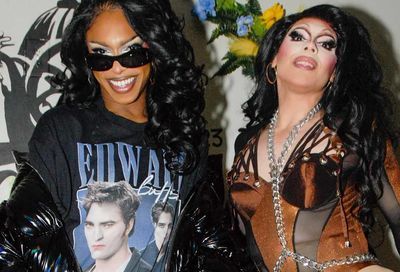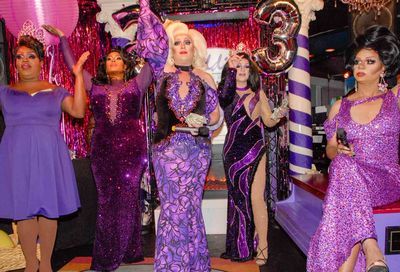The Importance of Dixie
More than content with conventions of the past, Dixie Carter is still willing to take the journey to become a truly modern, progressive woman.
Editor’s Note: The following interview originally appeared in the Sept. 3, 1998 edition of Metro Weekly. It has been modified slightly from from the original print edition.
When God designed the perfect woman, he must have had Dixie Carter in mind.
The stately, elegant Southern Belle, with her rose-silk complexion, warm, welcoming smile, and engaging way with a story, is every bit as intoxicating as you would imagine her to be.
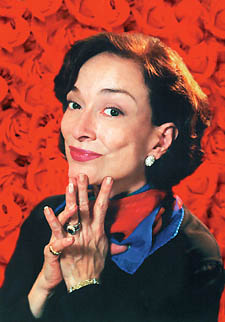
Dixie Carter
(Photo by Todd Franson)
Currently in town for a stint at the Shakespeare Theatre, where she’s starring in A Woman of No Importance, the actress settles back for an extended interview in her comfortable Lansburgh apartment. Carter perches next to a lamp in which she has just inserted a salmon-colored lightbulb (“I just love the softness of light”), and sips a tall glass of buttermilk. Once the tape is rolling, she launches into her own roll, talking about everything and anything that comes to mind.
Unlike Designing Women‘s Julia Sugarbaker — the blunt, vociferous liberal she portrayed on the show that made her a nationally known star in the late ’80s — the Tennessee-born Carter is an old-time traditionalist: slightly conservative with roots planted firmly in the etiquette and gracious mannerisms of the Deep South. And yet she is trying to change with the times — you can hear it in the way she works through her answers about issues such as gay marriage.
Dixie Carter is willing to take the long journey to become a truly modern, progressive woman. But then, there’s a side to her that’s more than content with conventions of the past. She is, without doubt, the very best of both worlds.
METRO WEEKLY: The Shakespeare Theatre’s Artistic Director Michael Kahn has a history of getting big-name national stars to the theatre. How did he seduce you to appear in Wilde’s A Woman of No Importance?
DIXIE CARTER: I’ve known of Michael, of course, and of his reputation. And just this year my husband, Hal Holbrook, managed to work out a time where he could come and do Shylock in Merchant of Venice for Michael. Then Hal received the Shakespeare Theatre’s Will Award this past spring and I was here the night he presented it. We had lunch together, Michael and I did, and I got along so well with him that I developed an ambition to come here. Then he called and asked me if I’d do this play.
Now, this woman I’m playing [in A you Woman of No Importance] doesn’t have many tools at her disposal to help her in her situation. You know the story: she has a son and she’s covered up the fact that he’s illegitimate all these years. And because of the time, and because of her shame, she has no one she can turn to for help. She has no power in the circumstances. But she has one concern, one motive, one thing that fuels her and gives her strength. And that is her love for her son. It’s a really interesting, alluring part for me — it’s particularly hard and frightening.
MW: What’s frightening to you about the role?
CARTER: The style. Will it be possible to make a believable, living human being out of this she character? Will my English accent be just right? That matters such a great deal to me. I think all Southerners — especially Southerners who go into show business — are made to be very self-conscious about being Southern. They are teased a lot. Laughed at a lot. Sometimes it’s funny. But sometimes it isn’t funny at all. People like Robin Williams — although I understand he’s a darling, sweet man — are very unkind to us. Because when he does a stupid character, it’s got a redneck accent. The trouble is that that person does exist in the South — Southern hicks are distinctive. They are so easy to seize upon to make fun of, don’t you think? Still, there are so many more decent, fine people in the South.
The notion that Southerners are stupid is one that I encountered when I very first arrived in New York. I was surprised — nobody prepared me for it. I was very smart. I was valedictorian of my class in high school. I had won the math award. I had won all the speaking contests and writing contests and essay contests. I was very ambitious and I expected that maybe I would have a career as a singer. I wanted to sing grand opera. Sadly, I wasn’t going to get to do that. So then, I expected to teach English or study law and become a lawyer. The fact that I wound up as a comedienne is funny.
MW: You’re more than a comedienne — you’re a well-known star.
CARTER: That wasn’t always true. Earlier in my life, I quit acting entirely to get married and raise my children. I never thought I would go back to it, but the break-up of that marriage forced me into it. I had a difficult time getting a chance to work again. And the idea that I became well-known in the middle years of my life is thrilling. It’s called late blooming, my dear.
MW: Do you think we put too much emphasis in this country on early blooming?
CARTER: Yes, I do. It puts a great deal of pressure on young people now. I grew up in a family who loved me. I was a recipient of what we now call unconditional love. I didn’t feel the kind of pressure that young people feel now. My folks would always say “You can come back home any time you want to, precious. Don’t you worry. You can come back home any time.” And I knew it was true. So I felt free and easy — very, very happy to go out into the. world. It didn’t frighten me. They say that most people who succeed in New York City come from the back side of nowhere, as I did. Their ignorance gives them courage because they don’t know that it’s impossible to go make a success. I got my feelings hurt very, very badly in my first marriage — couldn’t believe that it failed. Which meant to me that I had failed. Then [when I tried to get work again as an actress], I realized that the world thought I was beyond my pretty years. By the time I started to try to go back to work again, I was 33.
I met a woman named Dale Davis who was subbing for Michael Thomas — a New York agent, a wonderful, very elegant, fine man. He was going to Europe for the summer and she had come up from her job as a teacher of creative writing at the University of Tennessee. And a mutual friend forced me to leave my summer home and drive across the George Washington Bridge to meet this woman. I didn’t want to. I was horribly depressed — I felt so ugly and so old. And you know, I walked through the door of that office and looked at her and she began to laugh. And I began to laugh. It was one of those things that makes you believe in reincarnation. She said, “Goodness gracious, Dixie Carter, you can work. I’ll get you a job right now!” And so she did. She got me a job right away on the soap opera The Edge of Night. I played Brandy Henderson, assistant district attorney. I was on it for two and a half years. I never let people make fun of soap operas or soap opera acting in front of me. Because, boy, I was so grateful to them.
MW: One of the things that you did early on, in 1981, was the television movie The Killing of Randy Webster.
CARTER: Yes…
MW: And the important thing about that movie was…
CARTER: [Laughs.] Was…?
MW: That you met…
CARTER: …Mr. Holbrook! Whom I called Mr. Holbrook, and he said I was a big Southern phony. He wouldn’t have anything to do with me and I was just crushed. I didn’t think he liked me. But I really was smitten with him when I met him. He’s an awfully good man. You know how nice you’d think he would be from having seen him on the screen? Well, he’s nicer.
MW: You’re his wife, you have to say that.
CARTER: No! A person doesn’t have to say that much. Anyway, he didn’t cotton to me at first. I overdid trying to be pleasant and polite and he wasn’t very responsive. But then I got so sick with the flu and I gave up. Suddenly, he became very attracted to me and decided that although he had given up women — he had been married and divorced twice — that he would just ask me out to dinner. Well, that was the end of him.
MW: How long have you been married?
CARTER: Fourteen years last May the 22nd.
MW: Your first marriage didn’t work, but this one has. What’s the key to the success of your marriage to Mr. Holbrook?
CARTER: Without going into the problems of my first marriage, I will say that when I married Hal, I was determined that it had to work. If I get upset with Hal, I go away. It is a very helpful thing to be able to afford a domicile that allows two people to just get away from each other. And separate bathrooms are a definite must. I mean, totally. Hal and I both felt like it was do or die. A divorce would not have been possible.
But divorce also wasn’t possible when I married my [first husband] Arthur Carter. It was unthinkable. Unthinkable! I was so ashamed. I didn’t tell my parents for the longest time that there were problems in my marriage because I was so ashamed.
MW: Gays and lesbians also keep secrets from their parents for the longest time, so It’s interesting to hear it from another point of view. We all have our secrets, don’t we?
CARTER: It isn’t dissimilar, is it? Even with parents who loved me, I felt like I would be disappointing and shaming them by being the only person in our family to ever have a divorce. Finally we just have to throw ourselves on our parents’ love and say, “Okay. We take the jump off this high board.” Usually, you don’t do it until you push yourself into a comer.
MW: I’d like to talk a little about your work in Designing Women. You had a quite a large gay following with that show.
CARTER: I wonder why that was?
MW: I was hoping you could tell me.
CARTER: Well, I’ve often wondered about it, but I don’t know why. I know that it’s true because my daughters told me [we had a gay following] long ago. And many people have told me that there were [gay] bars where they replay some of my tirades from the show on a television set and everyone in the place knows the speech word-for-word and says it right along. That’s thrilling. I wish I could hear that sometime.
MW: Your character, Julia Sugarbaker, was quite a firecracker.
CARTER: Well, now every situation comedy has one character who delivers a big tirade sooner or later. It’s entirely derivative. And many of Julia’s ideas and sentiments, presented on Designing Women are recycled through so many other shows — I won’t name names here. But I was proud to be part of that television experience. Because I consider it a theatrical experience. Those girls were good.
MW: The show was gay-friendly in its politics and themes. And it was, to my knowledge, the first sitcom in the history of television to deal with the AIDS crisis in a compassionate setting. And that was 1987. It was…
CARTER: …Unheard of. Do you want to know something just shocking? [The show’s producer] Linda Bloodworth-Thomason’s mother died of AIDS. This was before that particular episode was written. Her mother got AIDS from a blood transfusion administered by the Red Cross. We were in the first year of the series and Linda came to me — she was crying hysterically and horrified — and she told me her mother had been diagnosed with AIDS. I had known her mother—she was a lovely, smart, adorable, won- derful woman. And she was carried away by this awful disease.
Although she always wanted to be the vanguard, Linda might not have been driven to write this show so early in the scheme of things. But she was thrown over the abyss because her mother had died and was treated in such an awful way in the hospital at the time — nurses could not be prevailed upon to go into her room.
MW: What was the reaction on the show’s set when they brought in the AIDS script?
CARTER: We were overwhelmed. We hadn’t made the connection then about how powerful these shows were going to wind up being! We had no idea. No idea. We had no idea that it would be something that people would come up to us years later on the street and say, “That show you did about AIDS meant so much to me. Thank you so much.”
CBS was a little worried about that show and others as well — there was a show about rape that cost us one of our writers because she disagreed with the way that Linda presented the rape issue. Almost every show that we did had something in it that was exciting. But we didn’t know that it would resonate. And I don’t know why we didn’t — except that we were on that treadmill turning out an opening night every Friday night. Linda wrote all by herself. She would write a show in five or six hours. If you know about television writing, usually it’s a huge committee of people. And it takes a very long time to write it. And then there are many revisions. But Linda would write a show and, as unbelievable as it sounds, it didn’t need rewrites. This was truly unthinkable in the world of situation comedy. It was like a Rolls Royce car. You just got in and drove.
MW: What did the role of Julia Sugarbaker teach you as a person?
CARTER: The role of Julia was pretty far away from who I am — I’m pretty conservative and traditional. But Julia made me think about things that I’d still not known. She opened my mind to her way of thinking. She. taught me to be able to speak up for myself which I, being Southern, well-mannered and polite, never had done before. I’ve gotten so that it’s all right for me to have opinions of my own. Before Julia Sugarbaker, I skidded around and more or less danced to everyone else’s tune. It was unbearable for me to be in disagreement or discord with anybody.
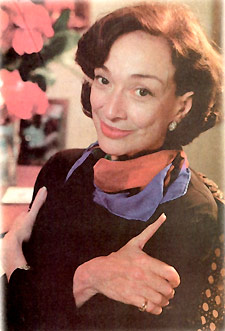
Dixie Carter
(Photo by Todd Franson)
MW: Let’s get some opinions from you. Do you have any thoughts on gay rights?
CARTER: I think that gay rights should exist.
MW: Let me be more specific. What about the possibility of gay marriage?
CARTER: That’s hard for me, because I’m very old fashioned, very old-timey. So that idea is hard for me. On the other hand, maybe the most loving marriage that I’ve ever seen is a gay marriage. It has not been codified as such by the church, but it is a marriage. And has been for years and years and years. But to answer your question, I have to work through what marriage means — and the first thing in my mind goes to is that marriage is for the procreation of the race. It’s a sacrament to unite people so that they can begin a family and have children. But Hal Holbrook and I got married at an age past when we can expect to have children. So here I am in a very happy marriage that I think is fine. So if I feel that way about my marriage to Hal, why would I have a problem with a gay marriage? Still, it’s hard for me. I’m very traditional.
MW: Another issue that’s been raised recently in a big way is called “reparative therapy,” where gay people are saying they’ve been cured through various ministries led by the right wing.
CARTER: I think the word cure is insulting, isn’t it?
MW: Yes. And of course the danger is that it suggests homosexuality is a disease, which it’s not.
CARTER: Tell me, are these people who are “cured,” are they ever going to be happy?
MW: It’s hard to say.
CARTER: Well, down the line, it will be discovered whether or not they will be happy. I hate to use this corny expression, but everybody has got to find out who they are and what their needs are. And putting yourself in a straight jacket for appearance’s sake is not going to get it. But as I’ve said, I’m old-fashioned. I’m still trying to work through [the idea of] women preachers. I am a person for whom change is difficult. I don’t agree with the way that children are brought up now for the most part. I can’t bear to see them in those little tennis shoes they put on children. Please. And those vile colors. I just want to see little babies in white. I want to see them in pastels. I don’t want to see little children in red and black. You know? I don’t want to see them in those orange and black things that they wear. I feel like such an anachronistic person, but I am slowly coming around — my children are slowly getting me close to where I should be. Maybe by the turn of the century, I’ll be up with everybody else.
MW: I’m guessing you must have really had a problem with President Clinton’s disclosure on national television the other night regarding his inappropriate relationship with Monica Lewinski.
CARTER: I just wish that none of us knew about it. I just wish we could back to the days of Jack Kennedy. That’s all I can tell you. I supported Mr. Clinton when he ran for office. What you can do in office — we elect on the basis of that.
MW: Whose fault do you think this mess is? Clinton’s? Ken Starr’s? The media’s?
CARTER: It’s the American People’s fault! The American People are busy lowering their standards in every possible direction. In the movies, in television. What we require of our children in school.
MW: What’s the answer? How do we get back on the road to salvation?
CARTER: Make Michael Kahn president.
MW: The Religious Right might not like that, because then we’d have a gay president.
CARTER: So? We’d have a brilliant gay president who has answers. Who has a sense of an elegance and style. And who has a sense of history and a very intelligent perspective. I’d vote for Michael Kahn for president in one second. That’s my answer.
Support Metro Weekly’s Journalism
These are challenging times for news organizations. And yet it’s crucial we stay active and provide vital resources and information to both our local readers and the world. So won’t you please take a moment and consider supporting Metro Weekly with a membership? For as little as $5 a month, you can help ensure Metro Weekly magazine and MetroWeekly.com remain free, viable resources as we provide the best, most diverse, culturally-resonant LGBTQ coverage in both the D.C. region and around the world. Memberships come with exclusive perks and discounts, your own personal digital delivery of each week’s magazine (and an archive), access to our Member's Lounge when it launches this fall, and exclusive members-only items like Metro Weekly Membership Mugs and Tote Bags! Check out all our membership levels here and please join us today!




